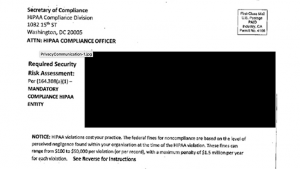
Cyberattacks on State, local, Tribal government up 50%
Since 2017, attacks – which the report defines as targeted instances of intrusion, fraud or damage by malicious cyber actors rather than discovery of insecure
Every day we see a new article about a security breach. The Covid-19 crisis is creating new challenges and many organizations are tracking additional information that must be kept private.
Is the threat real? Is your organization safe? Or, is it hopeless and just a matter of time before you have a breach?
You are unlikely to protect yourself from a state actor, but the vast majority of breaches are far less organized hackers looking for easy targets. This means that you need to have defenses that are stronger than your neighbors on the Internet. And, since everything in the world is equidistant on the Internet, you have a lot of neighbors!
The damage and embarrassment of a breach are often under-estimated. Let’s assume you understand the risk. What can you do about it? First, let’s review.
You’ve likely done many things:
Maybe. Is maybe good enough?
The challenge is that too many organizations, including tribes, have been hacked in the past year with all the aforementioned systems and staff in place.
What’s missing?
You may be paying for a highly skilled CIO or IT Director. But, it’s not enough. Here’s why:
Some advantages of a fractional CSO:
The right fractional CSO knows how to help your existing staff flesh out their processes and knowledge and be a “team player.”
Money doesn’t always deliver the best solution.
We can provide you with a highly experience fractional CSO, one that top Fortune 100 companies and government organizations rely on for their security.


Since 2017, attacks – which the report defines as targeted instances of intrusion, fraud or damage by malicious cyber actors rather than discovery of insecure

The Office for Civil Rights at the U.S. Department of Health and Human Services has warned health systems about what appears to be something of

Mobilize.Net and AIMHI form a strategic alliance to enable advanced IT solutions for government contracts BELLEVUE, WA – Jan 21, 2020 – Mobilize.Net and AIMHI,

ST. LOUIS-BASED SAFET, INC., ANNOUNCES 2019 GRANT RECIPIENTS SafeT, Inc, an industry leading solution provider of SaaS solutions in HIPAA, OSHA, and PCI compliant information
Is the threat real? Is your organization safe? Or, is it hopeless and just a matter of time before you have a breach?